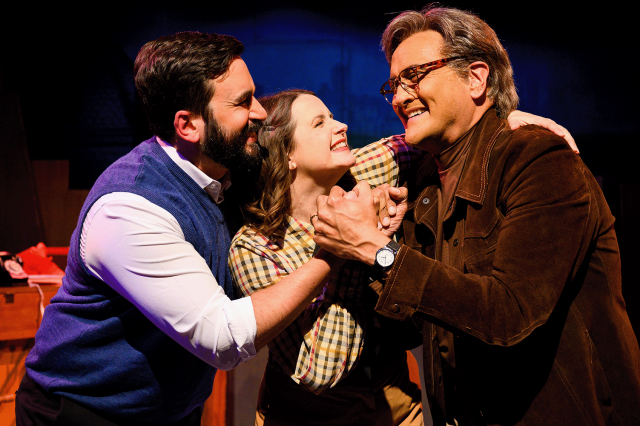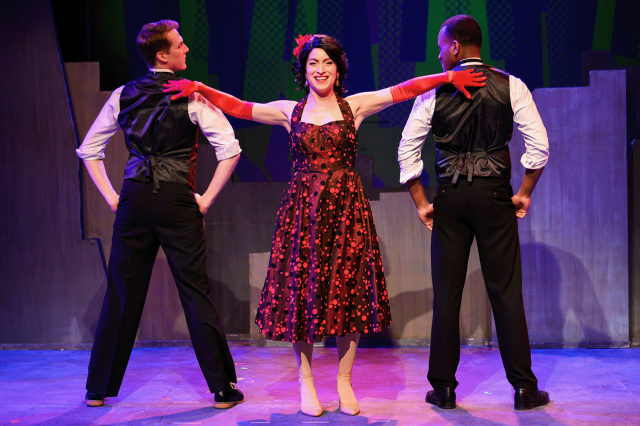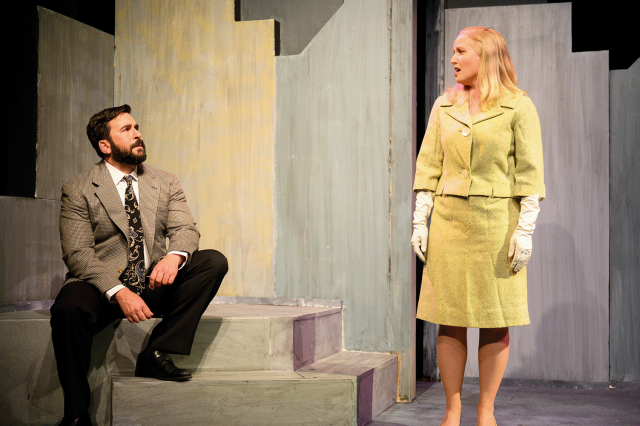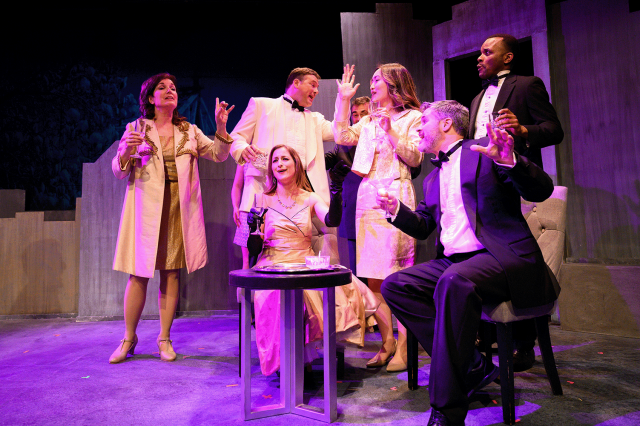Merrily We Roll Along
Sondheim's Checkered Musical Rises Again
By: Victor Cordell - Mar 28, 2023
Alert: Sondheim afficionados and other lovers of musicals. Complete your dance card. Take advantage of attending 42nd Street Moon’s new production of the rarely seen “Merrily We Roll Along.”
First, the easy part in discussing this stage oddity. “Merrily We Roll Along” tells the evolving relationship of friends from 1957 to 1976. The central figure is Frank, who begins as a poor, idealistic composer of musicals who cracks Broadway and then becomes successful composer for movies. He is also a serial lover with a succession of girlfriends and wives. Charley, Frank’s childhood best friend and lyricist during the Broadway days, becomes a family man and staunchly retains his artistic ideals, unwilling to bend to the demands of Hollywood. The two men part ways.
Now for the complications. When Stephen Sondheim’s “Merrily We Roll Along” hit Broadway in 1981, he was esteemed as the finest composer/lyricist in the stage musical idiom. But for various reasons, this work was an abject failure. However, it was subsequently reworked, winning various awards Off-Broadway and on the West End. Confidence in the revision has reached the point that it is scheduled to play Broadway this fall. That said, issues remain.
A distinctive, but not unique, feature of “Merrily We Roll Along” is that the story unfolds in reverse time. We first see Frank as the toast of the town, hosting a party for Hollywood glitterati, and work backward to a rooftop on 110th Street in Manhattan, where Frank, Charley, and their new friend Mary view Sputnik and dream of the future. The narrative arc is not remarkable, but serviceable as a libretto for a musical.
However, there are reasons that reverse-time storytelling is atypical. Because it doesn’t conform to human experience, it is harder for the viewer to remember details and make factual connections as the story proceeds backward. Perhaps more importantly, the conceit inhibits emotional involvement, as we don’t observe character evolution in its normal sequence. Although Sondheim selected the Kaufman and Hart play of the same name with the reverse storytelling in mind, many will find that device to be the weakness of the musical.
Happily, there are good reasons to see the current rendering. Those familiar with 42nd Street Moon will see how this offering fits the company’s modus operandi. Obviously, it is a musical, and one that calls for a large ensemble, but with limited orchestration and minimal staging, all of which suit the company. But for that, you get Sondheim – witty, and sometimes searing lyrics, creative rhythms, often delivered in patter style, and great music. The music, however, is a little off the composer’s beaten path – a bit more conventional Broadway and a bit less dissonance. There also seems to be an unusual amount of reprise, and not a lot of memorable melodies, though the leading phrase of the title song, which recurs a lot, is a prime candidate for an earworm.
The performers are also typical of the company, with many veterans of earlier productions. Will Giammona heads the cast and is in fine voice. But DC Scarpelli as Charley, whose vocals vary, delivers the real show-stopper, “Franklin Shepard, Inc.,” largely a funny talk-sing about how they work, how they play, and how they are already going their separate ways.
Indeed, perhaps the central theme of the show, which is explicitly revealed soon after, is that good friends don’t want good friends to change. It is very true to life as we all go through losing relationships because of growing in different directions, even as in the case of Frank and Charley, when the divergence has major financial consequences. A very public, real-life case in point is when Paul McCartney ultimately acknowledged that it wasn’t the presence of Yoko Ono that caused the Beatles to break up. Their fans wanted them to remain together and unchanged forever, but as McCartney said, they simply grew up and apart.
Much of the sauce in this production actually comes from the female secondary leads. Mary, portrayed by a spritely Melissa WolfKlain, is the third friend who the men meet in 1957. For years, she is the conciliator who works to keep Frank and Charley together, but in time, she becomes a liability rather than an asset in keeping the peace. A sharp portrait comes from Christine Capsuto-Shulman, who plays Gussie to the hilt. She will become Frank’s second wife. On the plus side, Capsuto-Shulman has a wonderful and powerful singing voice and charismatic pizzazz. On the minus side, her character is selfish, self-centered, and always one to create friction rather than harmony. Gussie is trouble, but because of her allure, some men can’t avoid entrapment.
The ensemble effectively acts to brighten the stage and sound, usually as party goers. Their voices are uneven, but some stand out, such as Juliana Lustenader, who also plays the role of Beth, Franks first wife.
In all, this work will not rank among Sondheim’s masterpieces, but that’s setting a very high bar. This production meets expectations for the company’s offerings and does provide plenty to those interested in the musical genre.
“Merrily We Roll Along” with music and lyrics by Stephen Sondheim, book by George Furth, and based on the play of the same name by George S. Kaufman and Moss Hart is produced by 42nd Street Moon and plays at Gateway Theatre, 215 Jackson Street, San Francisco, CA through April 9, 2023.




